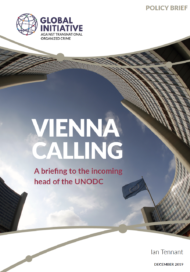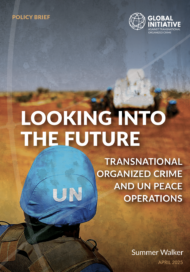Posted on 16 Jan 2018
It is widely known, particularly among those who have worked within the UN System, which countries are making a genuine effort to improve the lives of their citizens. This may be in terms of raising people out of poverty, providing healthcare and education, fighting climate change, eliminating ethnic and religious discrimination, seeking proper governance and the rule of law, or countering corruption and organized crime in all its forms. Although the list of challenges is virtually endless, the same cannot be said for the list of nations committed to addressing them.
Clearly, there is a world of difference between knowing that a nation is underperforming in its efforts to drive development and change, and proving this beyond doubt. But is that really why the UN and other international governmental organizations shy away from pointing the finger – especially at their member states – and bringing power holders to account? Or is it more a case of stiff adherence to diplomatic and political correctness?
The US: An example to look to
The Obama administration coincided with increasing awareness in the international community of the horrendous impact of the illegal wildlife trade on some of the world’s most endangered species. Among a number of initiatives adopted in the US during that period was the Eliminate, Neutralize, and Disrupt Wildlife Trafficking Act. One of the provisions of this act is for the US Secretary of State to provide Congress with a report listing ‘focus countries’ and ‘countries of concern’ in terms of wildlife trafficking.
On 16 November 2017, the State Department report was made available to Congress. The report lists the focus countries and countries of concern, and describes the methodology used to reach its conclusions.
Not surprisingly, the report attracted a good deal of worldwide media attention. Since 26 nations were listed as focus countries, it raised much discussion. In some cases, the lists were interpreted by the media as accusatory finger pointing, even though the report makes it very clear that featuring on the list does not reflect a negative or positive judgement. It merely indicates that a country is a source, transit point or consumer base for wildlife trafficking. It also points out that many of the countries listed have a strong political will to tackle the problem.
However, to use the American cliché, the countries of concern are a whole different ball game. Three nations were named: the Democratic Republic of the Congo, Laos and Madagascar. These countries received the negative designation because their governments ‘actively engaged in or knowingly profited from the trafficking of endangered or threatened species’. Even though the report tempers this damning verdict somewhat – ‘This designation does not indicate all parts of the government are or have been involved, but rather that there are serious concerns that either high-level or systemic government involvement in wildlife trafficking has occurred’ – to use a British cliché, this is still calling a spade a spade.
To my mind, the Secretary of State should be commended for taking this frank and honest approach. If any of the three countries of concern are reckless enough to demand that evidence be presented for their listing, I predict they will regret doing so and face even greater public humiliation. Such public accusation and finger pointing is long overdue.
The UN approach
Various UN bodies have become engaged in the field of wildlife trafficking in recent years. Two of them, the CITES secretariat and the UN Office on Drugs and Crime (UNODC), were among the sources of data for the US State Department report.
CITES has a proud record of holding its states parties effectively to account through its compliance procedures and sanctions processes. It is one of the few international treaties that have compliance procedures and that regularly make use of sanctions. If we were honest with ourselves, we would admit that it is the very existence of those procedures and sanctions that have, over time, dragged countries (sometimes kicking and screaming) into compliance, or at least near to it. It is also worth recognizing that the CITES secretariat staff are UN officials (although CITES is not a UN convention) and, to date, there have been no howls for their dismissal when they have implemented compliance processes or conducted assessment and verification missions to parties. Maybe their fingers are finely gloved?
The UNODC did excellent work with the release of its first World Wildlife Crime Report, but – even reading between the lines with a powerful magnifying glass – one will find little finger pointing or naming and shaming in it.
Similarly, the UN Environment Assembly also discusses wildlife trafficking and other environmental crimes, and considers reports from the UN Environment Programme secretariat, the UN Interregional Crime and Justice Research Institute, and other sources. However, there seems to be little scope or desire for compliance and sanctions to be discussed in the conference halls of the UN Environment Programme headquarters in Nairobi.
Learning from this example – UNTOC, UNCAC and the UN System
An increasing number of governments, organizations and individuals are pondering how effective the UN Convention against Transnational Organized Crime and the UN Convention against Corruption are proving to be. One would not need many digits to count the finger pointing that takes place when the states parties to these treaties come together.
No one wants the UN System to adopt some TripAdvisor-type free-for-all, where negative comments go unsatisfactorily unchallenged. But – looking again to CITES as an example of a more accountable system – I defy anyone to show me a party to CITES that has been sanctioned unfairly, inappropriately or contrary to the convention’s provisions. Experience of work in international organizations shows us that encouragement, assistance, support or capacity building – call it what you will – only goes so far. Sometimes, even a bagful of carrots is not enough: you also need the stick.
The UN System ought to follow not only the approach of the State Department and CITES, but also that of an earlier US president, Theodore Roosevelt. His principle for foreign policy, ‘speak softly and carry a big stick’, should be adapted by the UN: ‘speak softly and point a big finger’.



